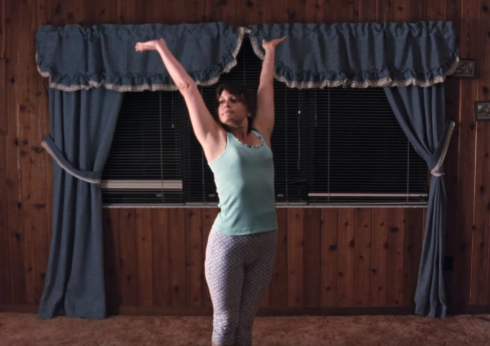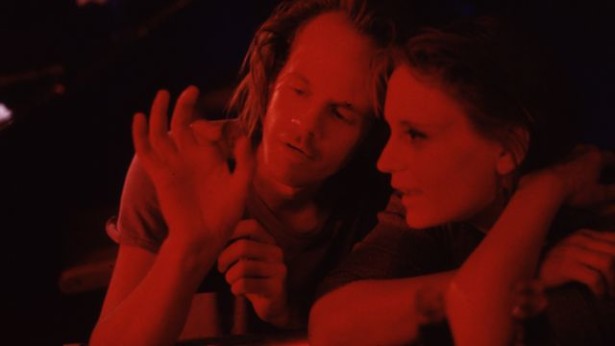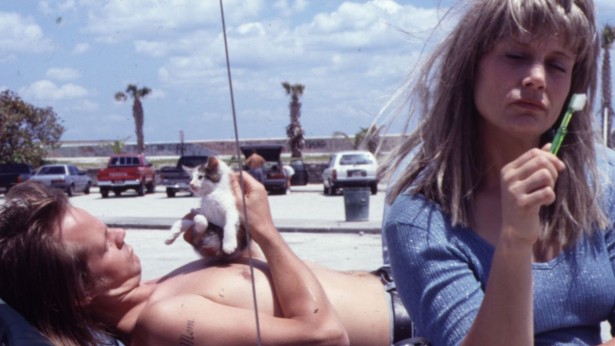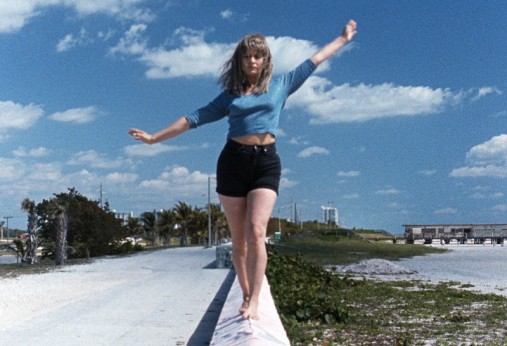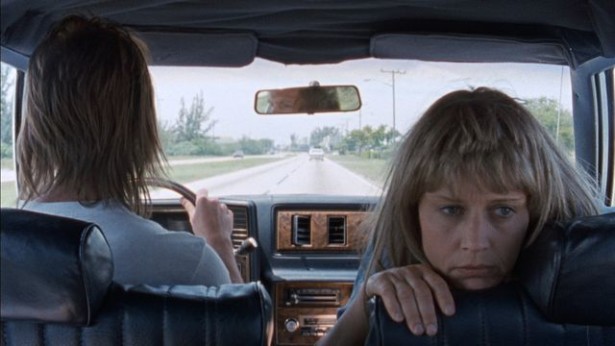River of Grass
Dir. Kelly Reichardt (1994 81 mins, 16mm)
Lisa Bowman, Larry Fessenden, Dick Russell, Stan Kaplan, Michael Buscemi
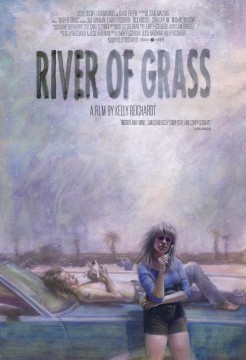
A drowsy, sun-drunk road movie in which a would-be Bonnie and Clyde never really commit a crime, fall in love, or even hit the road.
“Every bit as good as Monte Hellman’s TWO LANE BLACKTOP”
“A lively, entertaining movie about how life isn’t like the movies.”
“One of year’s smartest indies. Not for squares.”
Metro
Matt Prigge 3/11/2016
‘River of Grass’ revives Kelly Reichardt’s unique debut
Jean-Luc Godard came close to directing “Bonnie and Clyde.” He didn’t, but if he did, bits of it might have looked like “River of Grass,” Kelly Reichardt’s lovers-not-quite-on-the-lam riff. A minor hit at Sundance in 1994 then quickly forgotten, it’s been revived in part because its director later became an indie god, crafting such art house hits as “Old Joy,” “Wendy and Lucy” and “Meek’s Cutoff.” “River of Grass” resembles none of those, which feature long, trancey stretches and, nowadays, big name actors. “Grass,” meanwhile, has experimental editing and big lifts from Godard’s “Pierrot le fou,” another film about a couple trying to escape crushing mundanity into their own conjoined bubble.
Then again, at least Jean-Paul Belmondo and Anna Karina in “Pierrot” were hot for each other. Among other twists on the crime genre, Lisa Bowman’s Cozy and Larry Fessenden’s Lee Ray just seem thrown together by boredom. She’s a northern Miami housewife who one night pays a whimsical trip to a dive bar. There she meets Lee Ray, a layabout who just found a gun. While canoodling by a friend’s pool, she accidentally shoots a man, so they decide to hit the road — or just the area’s motels, since they can’t even afford the interstate toll.
Awash in almost-no-budget ’90s indie smudge, it’s a “Bonnie and Clyde” about people who only wish they were Bonnie and Clyde. It’s a film where not-quite-lovers run in circles, where the only booty they pilfer is his mom’s record collection, where Lee Ray can’t even successfully stick up a convenience store. (When he tries, he puts off drawing his gun for so long another guy runs in and robs it himself.) He’s no Warren Beatty rogue but a loser, with a missing front tooth and a weird “mom” tattoo, though Fessenden — the director of brainy horrors like “Wendigo” and “The Last Winter,” who also edited no top of co-starring — does look a bit like a Jack Nicholson gone to seed. Cozy didn’t even kill the man, though Lee Ray tells her she did, just to keep their adventures going.
“River of Grass” isn’t just about bringing a hard-boiled genre down to earth. Its heroes may be cosplaying as wanted criminals, but their anxieties run deeper. In fact, they’re downright cosmic. Cozy is slightly older than a Bonnie Parker type, and never leaving the same run-down part of Miami has made it feel like it’s her entire world. At one point — on a narration track that’s like a more self-aware version of the one in “Badlands” — she talks of how she once tallied how many hours she’d been alive and how many she likely had left.
Reichardt likes to cut around, jumping between our heroes and their flabby, middle-aged men pursuers, or even jumping around character’s timelines. (The fragmented opening, which depicts a cash register being robbed, keeps returning to the detective who couldn’t stop it, brooding over his whiskey. Maybe he’s always in that bar, brooding over something else.) But no one’s going anywhere, and Reichardt captures little moments of time-killing: her sorta-lovers sharing a joint they hold between their toes; Lee Ray practicing his grifting skills by stealing his own wallet from his back pocket; Cozy poring over their stolen record haul. It’s a genre piece robbed of any and all pomp, and if it looks little like Reichardt’s subsequent work, it has the same devastatingly melancholic feel.
Criterion Cast
Joshua Brunsting 3/11/16
Joshua Reviews Kelly Reichardt’s River Of Grass [Theatrical Review]
Sure, much of the talk at this year’s Sundance Film Festival surrounded various new releases that the film world will likely be hearing more from in the coming months, but there was one film that, thanks to a new restoration, film fans get to re-introduce themselves to.
Entitled River of Grass, this film marked the debut of writer/director Kelly Reichardt, and found itself amid the releases of one of American independent cinema’s most important and influential years. Released in 1994, Reichardt’s film is one of a simple premise. Starring Lisa Bowman, the film follows Cozy, a house-wife who is under the assumption that she took a man’s life and has subsequently gone on the run with a strange drifter of sorts, Lee, played by Larry Fessenden. Cozy hasn’t actually killed anyone, and they never are able to really make it out of town, but instead lock themselves in a cheap local motel until whatever it is they think needs to blow over actually blows over.
While River Of Grass itself is a startlingly assured piece of work, it’s not from the same cloth as pictures Reichardt made following her return to filmmaking with 2006’s Old Joy. Where as her recent features have been quietly paced, mannered, composed dramas, River of Grass is comparably anarchic, with a quicker pace and filmmaking that feels far more energetic. Think of it as a Badlands style drama made in the Slacker generation, that shows just as much the power of Reichardt’s direction as it does the editing from star Fessenden. Reichardt herself would go on to edit every feature she directed from this point forward, and the comparisons between her style of filmic composition is decidedly different than what’s found here.
That being said, it’s still a superb debut for a filmmaker who has become one of American independent cinema’s greatest auteurs. The sequences here play out in the same mannered way that has become Reichardt’s calling card, and it’s quite interesting to see her play in a decidedly genre sandbox. There are bursts of energy here that are refreshing to see from the filmmaker, particularly after such quiet, meditative art pieces like maybe her masterpiece Meek’s Cutoff, but those looking for a Wendy and Lucy type drama won’t really find that with River of Grass. It’s a personal film for Reichardt, as she grew up not only in southern Florida, but had parents in the law enforcement racket, and there’s something in the film’s air that gives the world a shockingly lived in quality. Maybe it’s the gorgeous 16mm photography that, thanks to this new restoration, looks as good as it ever could have over 20 years ago.
River of Grass is something much more than a curio for fans of director Kelly Reichardt. A genuinely funny black comedy with top notch performances from Bowman (who has ostensibly disappeared from screens following this film) and Fessenden (who definitely hasn’t but hasn’t been quite as magnetic as he is here) this self described “road movie without the road, a love story without the love, and a crime story without the crime” is at once one of director Reichardt’s most personal films, and yet one of her most odd and engrossing.
AV Club
Mike D'Angelo 3/10/2016
The director of Old Joy made her debut with terrific outlaw saga River Of Grass
Over the past decade, Kelly Reichardt has emerged as one of American indie cinema’s finest directors, releasing a highly celebrated film (Wendy And Lucy, Meek’s Cutoff, Night Moves, the forthcoming Certain Women) every two or three years. To many, it may have appeared as if Reichardt launched her career with 2006’s terrific Old Joy, as she’d been missing in action for the previous decade-plus. Some cinephiles, though, spent those years impatiently waiting for her to follow up on the promise of her superb debut, River Of Grass, which premiered at Sundance in 1994 and received a tiny theatrical release the following year. The film never quite developed a real cult following, but it was singular enough to ensure that fans remembered Reichardt when she finally resurfaced. Now, Oscilloscope Films, with the help of some Kickstarter backers, have restored it and are re-releasing it in theaters (with a Blu-ray edition presumably to follow), giving audiences who missed it the first time around a chance to see how she started out.
Is there such a thing as a retroactive artistic departure? For all the obvious talent it displays, River Of Grass doesn’t much resemble Reichardt’s subsequent work, which is notable for its stillness and patience. At one point, early on, the action is cut to a frenetic drum solo, played by a cop (Dick Russell) who keeps a kit in his house and uses it to thrash out his frustration. In this particular instance, the cop is concerned because his adult daughter, Cozy (Lisa Bowman), has gone missing, and there’s evidence to suggest that she was involved in a shooting, though nobody was hurt. Cozy, however, believes that she accidentally killed a man, and she’s now “on the run” with Lee (Larry Fessenden), a stranger she’d met in a bar after he nearly ran her over on the highway. Those scare quotes are necessary because neither Cozy nor Lee has any money, so they never actually manage to leave town; they spend most of their time holed up in a cheap motel, for which Lee tries to scrape together the cash by selling his mother’s record collection.
Reichardt has Bowman—a compellingly blunt screen presence who’s barely acted since—narrate the movie in a folksy whisper that’s clearly meant to echo Sissy Spacek’s Badlands voiceover, and River Of Grass initially seems to belong to the same outlaw-lovers-on-the-lam genre. Cozy and Lee never develop any sort of romantic or even sexual attraction, though, and they haven’t actually committed any serious crime (which Lee soon discovers, choosing not to tell Cozy in order to prolong their adventure). Reichardt subverts expectations at every turn, while simultaneously painting a vivid portrait of southern Florida (the title refers to the Everglades, and the film goes back and forth between Broward and Dade County) in all its sun-drenched seediness. She gets an invaluable assist from Fessenden, a notable director in his own right (Wendigo, The Last Winter); he co-edited River Of Grass in addition to co-starring, and his jumpier sensibility, both onscreen and off, blends with Reichardt’s observational instincts in fascinating ways. If one were to watch this jagged, restless movie with no knowledge of who made it, guessing that it sprung from the same mind that created Old Joy or Meek’s Cutoff would be impossible. Intuiting that this gifted novice filmmaker would go on to bigger and better things, however, would be child’s play.
NPR
Ella Taylor 3/10/2016
Reichardt’s ‘River Of Grass’ Reissued: A First Film At A Fast Pace
Chances are, if you’ve seen a Kelly Reichardt film, it would be Wendy and Lucy, a small, languorous, utterly heartbreaking 2008 drama with a big star, Michelle Williams, as a young homeless woman trying to make her way to the Pacific Northwest with her beloved dog. Wendy and Lucy is an art film with a delirious sense of place, but it’s also a road movie, and far from Reichardt’s first. One way or another, every extreme indie she makes pays sly, ardent homage to genre. In Old Joy, two former buddies take a camping trip through the Pacific Northwest in an effort to refresh a friendship gone stale. The pacing in Meek’s Cutoff (also starring Williams) is so characteristically digressive, so little concerned with plot, you might miss the fact that you’re watching a rather leisurely feminist Western.
Reichardt is, in the best sense, crafty that way, and it doesn’t disparage any of her lovely mood pieces to say that in comparison, her 1994 feature debut, River of Grass — restored in vibrant color for a fresh release this week — moves like an express train. Not that it clips along exactly, even with a jazz soundtrack and frantic drum solos tracking a rumpled couple on the lam across the Florida Everglades, where Reichardt grew up. But before we get to a downbeat rampage across that landscape of dingy malls, scrappy palm trees and cheesy motels, meet Cozy (Lisa Bowman), a putative homemaker rotting away in a seedy Broward County suburb. Cozy has a sweet face and two babies with an indistinctly drawn husband — it would be stretching things to call the couple high-school sweethearts. But the mother-child bonding instinct is spectacularly missing from her makeup, and she spends her days dreaming of glamorous destinies in the performing arts.
The unpromising childhood that shaped Cozy plays out as black comedy with a mournful edge. In an unvarying monotone, she narrates her abandonment by a mother who fled when she was ten, leaving her to be raised by her father, Ryder, a drummer and crime scene detective like Reichardt’s own father. Played in an extremely yellow suit by Dick Russell, whose cratered mug looks rather like the Grand Canyon, Ryder is forever losing his gun. The weapon ends up in the woefully incapable hands of Lee Ray Harold, a wastrel played with hilariously insufficient menace by the horror auteur Larry Fessenden, who also edited and co-produced River of Grass. Given the pervasive pauses for inertia and gross incompetence, you may not be shocked to hear that Cozy, Larry and the gun are fated to meet in a bar, that the gun will go off, that there may or may not be a murder, which may or may not be solved. For this Bonnie and Clyde, just getting on the road is a logistical nightmare.
River of Grass is very funny, but in a more somber key it also test-drives what will become Reichardt’s specialty: the transformation of cheerless wastelands into backdrops for journeys of the parched soul. Her subsequent films are sadder, more freighted with the pain and alienation of an America that, one way or another, has put so many of its inhabitants out on the roadside. Reichardt invariably speaks for the dispossessed, and all her films must be seen. But River of Grass is her vital firstborn juiced by the fresh, untidy vitality of a newbie filmmaker doffing her cap to B-movies and the French New Wave. In that film she gives life’s castaways the gift of merriment, and an ending that holds up half the sky.
NEW YORK DAILY NEWS
Dave Kehr
“From BONNIE AND CLYDE to NATURAL BORN KILLERS American audiences have embraced the theme of young lovers on the run, engaged in sexy revolt against middle class conventions. Kelly Reichardt’s RIVER OF GRASS, a funny, sad and honest independent film, is the first American movie to deconstruct that myth.”
BOSTON GLOBE
J. Carr 2/15/1995
Kelly Reichardt’s RIVER OF GRASS is a smart little deadpan honey of a comedy about the way America has exhausted its pop-culture myths – maybe is simply too tired to get inside them anymore. A lot of would-be noire road movies spin their wheels, but RIVER OF GRASS does so on purpose. That’s the joke. The film’s impact is enhanced because it’s set in a singularly washed-out looking landscape, Florida’s Broward County, where only strip malls separate Miami from the swampy Everglades. Like all good neo-noirs, this one, though laconic, is tightly focused and revolves around a woman who’s trouble.
Fessenden puts amusing spin on Lee Ray’s increasing claminess, Bowman finds ways to make petulance diverting as Cozy, and Jimmy Ryder, as Cozy’s gunless – and suspended – cop dad stews with what you suspect might be real danger, despite the cockeyed way in which it’s packaged.
RIVER OF GRASS reaches its apotheosis when Cozy and Lee find themselves a quarter short on a toll bridge and are turned back towards Miami by a stern lecturing cop. Wicked stuff tickling away beneath the nothingness here. Reichardt’s satire is directed just as devastatingly at present-day mindlessness and its inability to reinvent pop myth as against the clichŽs people inhabit as a substitute for living. And yet there’s an affection for the cultural and spiritual meltdown her film’s world embraces. RIVER OF GRASS is incisive and funny. What’s even rarer, it’s simultaneously subversive and compassionate. Reichardt is a filmmaker to watch
A.V. Club
Sam Fragoso 3/14/2016
Kelly Reichardt on the re-release of her debut and being mad as hell
Kelly Reichardt is angry and always has been. Even as her ascendency in the world of independent cinema continues (with intimate, pensive gems like Old Joy,Meek’s Cutoff, and Night Moves), the Florida-born filmmaker refuses to be anything but apoplectic. Which is not the same as being unpleasant or ungrateful. She is neither. It’s just that Reichardt believes the world is one unmitigated disaster after the next, sporadically punctuated by fleeting moments of beauty. Coincidentally, that’s an apt description for River Of Grass, her breathtaking directorial debut which she poetically describes as “a road movie without the road, a love story without the love, and a crime story without the crime.”
Shot on 16mm, Reichardt’s entry into cinema is assured as it is imperfect; it’s the work of an emerging artist, a rebel still in search of a cause and voice. Nevertheless, it’s also a potent piece of filmmaking that has been lovingly resurrected by Oscilloscope Laboratories (and others) to create a new DCP. After the restoration’s premiere at this year’s Sundance Film Festival—where her latest movie, Certain Women, also screened—Reichardt sat down with The A.V. Club to discuss what spawned River Of Grass, her frustratingly content students at Bard College, and the origins of her beef with the whole damn world.
The A.V. Club: You didn’t stay for the screening. Do you not watch your movies?
Kelly Reichardt: No, I can’t watch them. But I edit them. By the time I’m done I’m just looking at the parts, and I would just be too frustrated.
AVC: Many people love your movies and yet you can’t enjoy them.
KR: I know. It’s not good. I can’t accept the joy.
AVC: That’s sad.
KR: But are you a happy person? Do you get to enjoy everything you do? Something you wrote? Do you read your writing and think, “I did a good job on that.” That may be generational thing.
AVC: Look at you. Right to the age.
KR: (Laughs) No, but I ask people, “What are you working on?” And they go, “I am doing the greatest painting right now.” And I’m completely jealous of that.
AVC: To answer the question: I dislike pretty much everything I’ve written once its about one or two months removed.
KR: I don’t dislike everything I do. Let’s just say, especially with a film, you don’t have an easy relationship with it when it’s done because it’s been your life. Making a film is very trying. I’m attached to them, and to the adventure of what it was to make that movie. At the very same time, I find filmmaking to be a super lonely, alienating experience.
AVC: Is there any part of River Of Grass that you look at with fondness?
KR: Larry Fessenden and I watched it without the sound to do the commentary. It was like two old people watching something and trying to remember everything. But I did say, sometimes, “That’s a good shot.” Then there’s one dissolve in the movie where you’re like, “What the fuck is that dissolve doing there?”
AVC: But how old were you when you made the film?
KR: Not that young. I was 30.
AVC: In those couple of years leading up to the film, what’s happening in your life?
KR: That’s a big question. I had gone back home to Miami to work on the script at around age 27, 28. Then I went to Nashville for awhile, and tried to write with one of the producers on the movie, Jesse Hartman, but then that didn’t really work out. So I moved back to New York, and I ended up writing the script there in my first apartment on 21st street.
AVC: Does that feel like a long time ago?
KR: Life has moved very fast. I’m in the age of now where I’m like, “I get it. This is all fast.”
AVC: But I feel that now.
KR: No you don’t. How old are you?
AVC: No comment.
KR: I’m 51. So I’m just saying, 30 years from now you’re going to have a different outlook. That’s what a midlife crisis is.
AVC: Are you having that right now?
KR: [Laughs.] I’m just saying that’s why that exists. You all of a sudden feel it. Only in America do we delude ourselves that 50 is midlife, too.
AVC: So what’s going on with you at 27, writing this script in New York?
KR: The joke with my friends was that I had a lot of beef.
AVC: And did you?
KR: Yeah!
AVC: With who?
KR: Everyone. The world. You name it. I ask that to my students. I say, “Where’s the anger in your movies? Draw from your anger.” And they go, “What anger? What are you mad about?” You should be angry.
AVC: But how much time should we spend being angry?
KR: Sam, more species are going to die in the next 10 years—
AVC: Shouldn’t we be enjoying our time while we’re here?
KR: No! I’m not miserable, but I can’t not be angry. As I’m talking to you, I’m looking at the window and can’t understand why there are six hundred thousand SUVs here in this little town. No one can even move. Why doesn’t everyone just get out and walk? Or just the fact that I’m really thirsty, but I don’t want to drink that bottled water. I just want water from the faucet. I’m not beyond enjoying anything. Waking up and having a project to work on is one of life’s great pleasures.
AVC: Is that when you’re happiest, working on a project?
KR: Happiness is a strange word. So conclusive. Happiness is a thing that happens for a moment, right? A strange dog runs up to you and licks your hand, and you’re just so happy that the dog has chosen you. Or your friend’s kid plops down in your lap and does something stupid.
AVC: Do you feel like you have purpose when you’re making a movie?
KR: I don’t have to be making something to feel like life has value. Friendships are valuable to me. But I like to have a project. I live to have something to waste my energy on, something to think about. To figure out like a puzzle.
AVC: Does it consume your life?
KR: For the last 10 years it has. I’m trying to figure out my situation all the time.
AVC: Kids?
KR: I don’t want them. I mean, I like them… but there’s enough kids. You don’t need me to have kids.
AVC: Plus, like you said, the world is going to shit.
KR: Exactly. But I’m thoroughly enjoying my friend’s kids.
AVC: You’re the person who goes on the friend’s boat, and then gets to leave the boat at the end of a fun night.
KR: No, I’m still the person on my friend’s couch, and I’d like to own the couch.
AVC: You never really revealed what exactly you had beef with at 27.
KR: It’s been a lifetime of trying to have less beef. Beef comes very naturally to me. I was born with my dukes up, but that’s not always necessary anymore. I have to retrain myself. As a child, I remember being in the pool at this pool party and having to get out of the pool to watch Nixon resign. My first idea of a president was of a guy who was a crook.
AVC: That set the tone for you.
KR: A little bit. Then, as I was coming to be an adult, the AIDS epidemic happened. Moving to New York, watching that unfold, and watching the activism around that… it was complete chaos of life, and then this horrific non-response from the powers that be. There was a lot of misery and sadness tied up in that.
AVC: Do you think all good cinema is driven by anger?
KR: You have to have some matter of dissatisfaction in order to be asking questions, or just acknowledging the complexity of the world and how fucking chaotic it is. The beautiful moment sits very close to the horrific one.
AVC: And now, do you feel any more at peace with the chaos?
KR: [Laughs.] In my mid-age? Yeah, I do feel more at peace—not with the world, but with myself.
Glass Eye Pix provided editing equipment for RIVER OF GRASS. Larry Fessenden served as sound and picture editor as well as associate producer and lead actor.
RIVER OF GRASS is the internationally acclaimed debut feature from writer/director Kelly Reichardt. The film screened in competition at the Sundance Film Festival in 1994 and went on to play in festivals including Berlin, San Francisco, and Seattle. It premiered in NYC at the Public theater and was distributed throughout the country by Strand Releasing. RIVER OF GRASS was nominated for four 1994 Spirit Awards, including Best First Feature and Best Debut Performance by an actress (Lisa Bowman), and took top prizes at the Velencie Film Festival for Best Film and Best Screenplay.
RIVER OF GRASS AVAILABLE ON VHS & DVD FROM WELLSPRING MEDIA
LISA BOWMAN (Cozy) is a New York-based artist who works in the medium of photomontage. Educated at the San Francisco, Bowman’s works have been exhibited in San Francisco, Los Angeles, New York, and Paris. RIVER OF GRASS marks her feature debut.
LARRY FESSENDEN (Lee Ray Harold) grew up in New York city. He performed in numerous plays throughout high school and in summer stock until he started directing and shooting films and videos in 1980. He has acted sporadically in film and video projects, including the feature HABIT. He recently did a stint on the soap “As the World Turns” and annually performs the lead role in a puppet show of Dickens’ “Scrooge.”
DICK RUSSELL (Ryder) is a native New Yorker now residing in South Florida. Dick fell into acting when he drove a neighbor to an agent’s office and was offered a part in a movie. Since then, Russell has appeared in numerous small parts in films, commercials, and on stage. Like the character of Ryder, Russell is also a former jazz drummer who is playing again with a South Florida band called “Jerry Cats and the Jammers.
STAN KAPLAN (J.C.) is a Miami-based actor and comedian who has appeared in over twenty stage plays over the past 15 years, including “Fiddler on the Roof,” “The Odd Couple,” and “Guys and Dolls”
MICHAEL BUSCEMI (Doug) has written and performed in a number of one-act plays all over the East Village with partner Steve Prestianni. He has also appeared in several short films including HAPPY HOUR, XXX-TASY, WAITING FOR THE GENERAL DECLINE, DAWG, CAFE BABEL and NIGHTSWEATS. He appears in the features HABIT and brother Steve Buscemi’s TREES LOUNGE.
KELLY REICHARDT (writer, director, producer) was born in Miami, Florida in 1964. Her father worked as a crime scene detective and her mother as a narcotics agent. Kelly first discovered photography through a crime scene camera, and her first marijuana cigarette from an unattended evidence bag. While studying film and video at the Museum School in Boston, she made a trilogy of super 8 road movies and some of the first S8mm music videos to air on MTV. She then moved to New York City, working as an art director on a number of low budget feature films. In 1991 Kelly returned to Miami to write and later direct RIVER OF GRASS, which went on to receive critical acclaim at the Sundance and Berlin Film Festivals. The film also received the Silver Palm Feature Film Award and the Pierre Kast Award for Best Screenplay at Valencia Film Festival. Kelly is currently at work on her next feature, “The Royal Court,” which will be filmed in Miami.
screenplay by KELLY REICHARDT
story by KELLY REICHARDT, JESSE HARTMAN
director of Photography JIM DENAULT
editor LARRY FESSENDEN
sound recordist MATTHEW SIGAL
production designer DAVE DOERNBERG
costume designer SARA SLOTNICK
makeup NINA PORT
assistant director GREG WEBB
production manager TED SKILLMAN
producers JESSE HARTMAN, KELLY REICHARDT
associate producers LARRY FESSENDEN
RALPH McKAY
SUSAN STOVER

"A funny, sad and honest independent film." Dave Kehr, THE DAILY NEWS
"A smart little deadpan honey of a comedy about the way America has exhausted its pop-culture myths." Jay Carr, THE BOSTON GLOBE
"Every bit as good as Monte Hellman's TWO LANE BLACKTOP" Godfrey Cheshire, DOWNTOWN




A drowsy, sun-drunk road movie in which a would-be Bonnie and Clyde never really commit a crime, fall in love, or even hit the road.
RIVER OF GRASS
Strand Releasing presents RIVER OF GRASS
a Cozy Production in association with Good Machine
starring LISA BOWMAN ~ LARRY FESSENDEN ~ DICK RUSSELL
STAN KAPLAN ~ MICHAEL BUSCEMI
production design DAVE DOERNBERG costume design SARA SLOTNICK
director of photography JIM DENAULT editor LARRY FESSENDEN
unit production manager TED SKILLMAN produced by JESSE HARTMAN
written, directed & produced by KELLY REICHARDT


